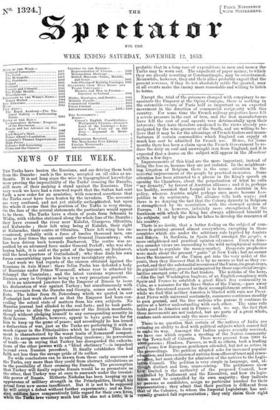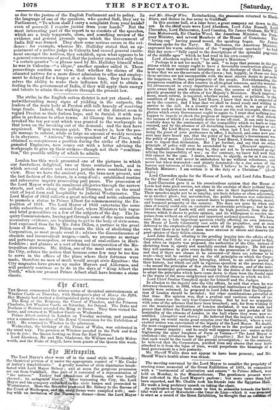There is no question that certain of the natives of
India are evincing an ability- to deal with political subjects which cannot fail to make its way., Amongst the Indian papers recently received, we have one which reports a meeting of the Native community, in the Town-hall of Calcutta. There were present from 3000 to 4000 persons ; Hindoos, Parsees, as well as others, took a leading part ; some few European gentlemen attended, but not as actors in the proceedings. The petition adopted asks for increased popular ito edu tion, and less exclusion of natives from offices of trust and remu- ner n, but most chiefly for admission of the natives to the Legis- lati Council. The petition is very simple in language, and, al- though distinct and firm, unpresuming. The petitioners show how limited is the authority of the proposed Council, how controlled by Parliament and the Executive, and how its legis- lation must be controlled by its own majority; they indicate no persons as candidates, assign no particular number for their representation ; they admit that their position is different from that of the Colonies, to whom the Imperial Legislature has uni- versally granted full representation; they only claim their right as due to the justice of the English Parliament and to policy. In the language of one of the speakers, who quoted Sadi, they say to Parliament, " To whom shall I carry a complaint from your hands? even of yourself, I require justice from your hands." But the most interesting part of the report to us consists of the speeches, which are a truly temperate, close, and searching review of the evidence and general grounds upon which the Government of India Bill was framed. They show some serious errors in the evi- dence : for example, whereas Mr. Halliday stated that an ap- pointment of a native judge in Calcutta had caused general excite- ment amongst the natives, they establish, upon what appears to be a general concurrence of proof, that the jealousy emanated only from " a certain quarter "—a phrase used by Mr. Halliday himself when he was in Calcutta—" a clique," another speaker called it. These proceedings confirm our view, that whether the claims of the educated natives for a more direct admission to office and employ- ment be delayed for a longer or a shorter time, they have them- selves the ability to make their influence felt, and to obtain a footing in the government of India, if they will apply their energy and talents to attain these objects through the present law.



































 Previous page
Previous page